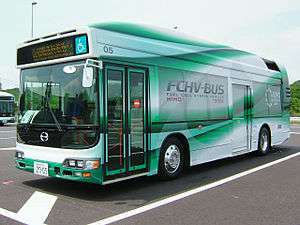Ultra-low-emission vehicle
An ultra-low-emission vehicle (ULEV) is a motor vehicle that emits extremely low levels of motor vehicle emissions compared to other vehicles. In some jurisdictions it is defined in law; low and ultra low emission vehicles may be given tax or other advantages,[1] while high emission vehicles may suffer restrictions or additional taxation.[2]
In California
California defines a ULEV as a vehicle that has been verified by the California Air Resources Board (CARB), United States to emit 50% less polluting emissions than the average for new cars released in that model year. Under LEV II regulations, the Tier I and TLEV classifications were removed for 2004. The ULEV is one of a number of designations given by the CARB to signify the level of emissions that car-buyers can expect their new vehicle to produce and forms part of a whole range of designations, listed here in order of decreasing emissions:
- TLEV (transitional low-emission vehicle)
- The least stringent emissions standard in California. California phased-out TLEVs in 2004.
- LEV (low-emission vehicle)
- The minimum standard for all new cars sold in California as of 2004.
- ULEV (ultra-low-emission vehicle)
- SULEV (super-ultra-low-emission vehicle)
- SULEV emissions are 90% cleaner than the average new model year car.
- PZEV (partial-zero-emission vehicle)
- A PZEV meets SULEV tailpipe emission standards, but has no evaporative emissions (i.e., no unburned fuel leaves the fuel system). A PZEV has a 15-year / 150,000-mile warranty on its emission control components.
- AT PZEV (advanced technology partial-zero-emission vehicle)
- An AT PZEV meets the PZEV requirements, but also meets some of the necessary conditions of a ZEV. AT PZEVs include dedicated compressed natural gas vehicles and hybrid vehicles with engine emissions that meet PZEV standards.
- ZEV (zero-emissions vehicle)
- A ZEV has no tailpipe emissions. These include battery electric vehicles and hydrogen vehicles (fuel cell vehicles).
See also
- Low-emission vehicle
- United States emission standards
